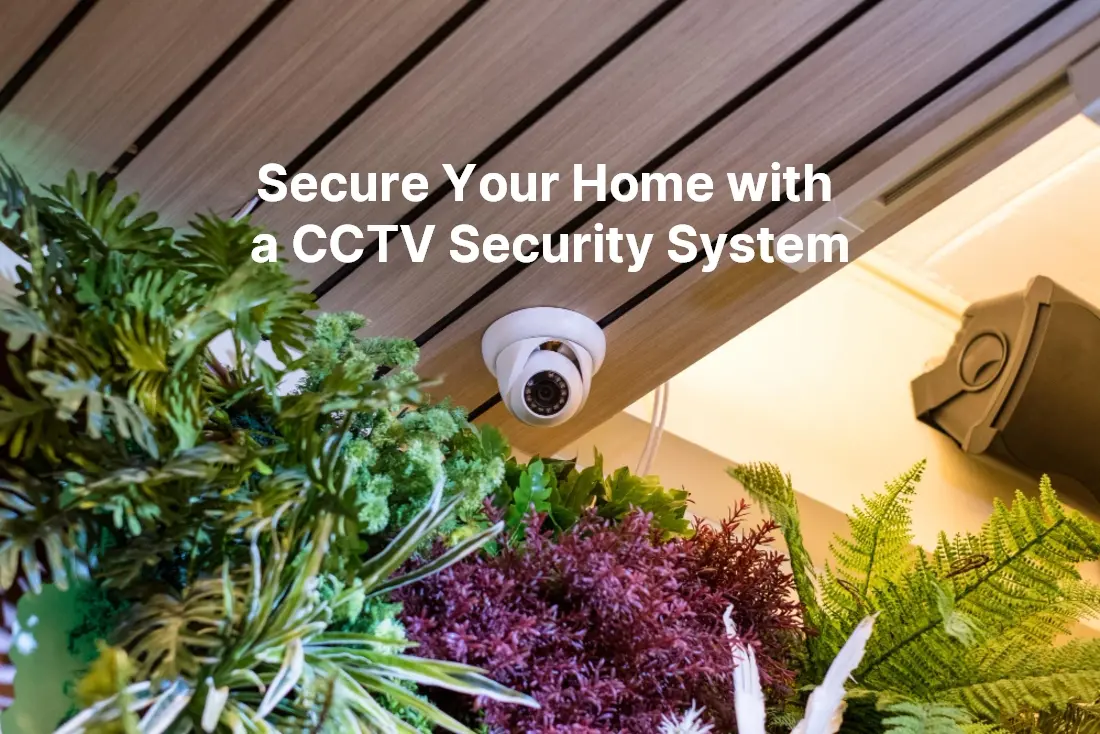
03 Jun Secure Your Home with a CCTV Security System: Everything You Need to Know
Feeling safe and secure in your home is essential for a peaceful and stress-free life. With the rise in burglary and theft cases, it has become essential to take measures to secure your home. A CCTV security system is one of the most effective ways to deter intruders and keep your loved ones safe. But with so many options available in the market, it can be overwhelming to select the right one for your home. That’s where this guide comes in. In this article, we will cover everything you need to know about CCTV security systems, from how they work to the different types available, and how to choose the right one for your home. So, whether you’re a homeowner looking to secure your property or a business owner looking to protect your assets, this guide will provide you with all the information you need to make an informed decision and take a step towards a safer and more secure future.
Types of CCTV Security Systems
There are many types of CCTV security systems available in the market. The most common types are analog, digital, and IP-based CCTV systems.
Analog CCTV systems are the oldest type of CCTV systems and have been around for decades. They are simple to install, and the cameras are connected to a DVR (Digital Video Recorder) that records and stores the footage. However, the video quality is not as good as digital and IP-based systems, and the storage capacity is limited.
Digital CCTV systems, on the other hand, use digital cameras that capture high-quality video footage. They are also connected to a DVR, which records and stores the footage. Digital CCTV systems offer better video quality than analog systems and have a higher storage capacity.
IP-based CCTV systems are the most advanced types of CCTV systems. They use digital cameras, which are connected to a network video recorder (NVR) that records and stores the footage. IP-based CCTV systems offer the highest video quality and storage capacity.
They are also more flexible and scalable than analog and digital systems, allowing you to add more cameras and expand the system as per your needs.
Benefits of Installing a CCTV Security System
Installing a CCTV security system has many benefits. Here are some of the most significant advantages of installing a CCTV security system in your home or business:
Deter Crime
One of the most significant benefits of installing a CCTV security system is that it deters crime. Burglars and intruders are less likely to target a property that has CCTV cameras installed, as they would rather not get caught on camera.
Evidence Collection
If a crime does occur, CCTV cameras can provide valuable evidence to the police. The footage can help identify the perpetrator and provide evidence to support criminal prosecution.
Remote Monitoring
IP-based CCTV systems allow you to monitor your property remotely from anywhere in the world. You can access the footage from your smartphone, tablet, or computer, giving you peace of mind that your property is secure even when you’re away.
Insurance Benefits
Installing a CCTV security system can also help you save on insurance premiums. Many insurance companies offer discounts to homeowners and businesses that have CCTV cameras installed, as it reduces the risk of theft and damage.
Do you require assistance selecting the ideal CCTV security system for your residence?
Based on your budget and security plan, Downtown Computer Services will offer suggestions for choosing security components. Call us at (954) 524-9002 right away, or request a consultation online.
Factors to Consider Before Installing a CCTV Security System
Before installing a CCTV security system, there are several factors you need to consider. These include:
Purpose of the System
What is the purpose of the CCTV security system? Are you installing it to deter crime, collect evidence, or monitor your property remotely? Understanding the purpose of the system will help you choose the right type of CCTV system and cameras.
Location of the Cameras
Where do you want to install the cameras? Do you need cameras inside and outside your property? Understanding the location of the cameras will help you choose the appropriate types of cameras and determine the number of cameras you need.
Lighting Conditions
What are the lighting conditions in the areas where you want to install the cameras? If there is low light or no light, you will need cameras with night vision capabilities.
Budget
How much are you willing to spend on a CCTV security system? Understanding your budget will help you choose the right type of system and cameras without overspending.
Maintenance Requirements
CCTV security systems require regular maintenance to ensure they work correctly. You will need to factor in the cost of maintenance and the time required to maintain the system.
Choosing the Right CCTV Security System for Your Home
Selecting the correct CCTV security system for your home can be overwhelming, given the number of options available in the market. Here are some factors to consider when choosing a CCTV security system for your home:
Type of System
Which type of CCTV system do you want to install? Analog, digital, or IP-based? Understanding the pros and cons of each type of system will help you make an informed decision.
Video Quality
What is the video quality of the cameras? The higher the video quality, the clearer the footage will be. If you want high-quality footage, you should choose cameras with at least 1080p resolution.
Storage Capacity
How much storage capacity do you need? If you want to store footage for an extended period, you will need a system with a large storage capacity.
Remote Access
Do you want to be able to access the footage remotely? If so, you will need an IP-based CCTV system that allows you to access the footage from anywhere in the world.
Budget
How much are you willing to spend on a CCTV security system? Understanding your budget will help you choose a system that meets your needs without overspending.
How to Install a CCTV Security System
Installing a CCTV security system can be a challenging task, especially if you have no prior experience. Here are some steps to follow when installing a CCTV security system:
Determine Camera Placement
Decide where you want to install the cameras and ensure they are in the right position to capture the footage you need.
Install the Cameras
Once you have determined the camera placement, you can start installing the cameras. Follow the manufacturer’s instructions carefully to ensure you install the cameras correctly.
Connect the Cameras to the DVR or NVR
Once the cameras are installed, you need to connect them to the DVR or NVR to record and store the footage.
Configure the System
Once the cameras are connected to the DVR or NVR, you need to configure the system to ensure it works correctly.
How to Maintain Your CCTV Security System
Maintaining your CCTV security system is essential to ensure it works correctly. Here are some maintenance tips to follow:
Clean the Cameras
Regularly clean the cameras to ensure they capture clear footage. Use a soft cloth to wipe the lenses and remove any dirt or dust.
Check the Wires
Check the wires regularly to ensure there are no loose connections or damage.
Update the Firmware
Regularly check for firmware updates and install them to ensure your system is up-to-date and secure.
Common Issues with CCTV Security Systems and How to Fix Them
CCTV security systems can experience a range of issues, from poor video quality to connectivity problems.
Here are some common issues and how to fix them:
Poor Video Quality
If you’re experiencing poor video quality, check the camera settings and adjust them accordingly. You may also need to clean the camera lenses.
Connectivity Issues
If you’re having connectivity issues, check the wires and connections to ensure they are secure and not damaged. You may also need to reset the system.
Storage Issues
If you’re running out of storage space, consider upgrading the hard drive or using cloud storage.
The Legal Aspect of CCTV Security Systems
Before installing a CCTV security system, it’s essential to understand the legal aspect of CCTV security systems. Here are some legal considerations to keep in mind:
Privacy Laws
Ensure you comply with privacy laws and regulations when installing a CCTV security system. You should also inform your employees and visitors that they are being recorded.
Data Protection Laws
Ensure you comply with data protection laws and regulations when storing and processing CCTV footage.
Conclusion
Installing a CCTV security system is an excellent way to protect your home or business from theft and crime. However, choosing the right system can be challenging, given the number of options available in the market. By following the steps outlined in this guide, you can choose the appropriate CCTV security system for your home or business and ensure it works correctly. Remember to maintain your system regularly and comply with legal requirements to ensure your system is secure and effective.
Choosing the right video surveillance system for your home can be a daunting task for the layman.
Let our experts at Downtown Computer Services help you choose the correct video surveillance system for your home. Call us at (954) 524-9002 right away, or request a consultation online.
Check out other relevant news
- How Easy-to-Use Hacking Tools Are Fueling Cybercrime
- Cryptocurrency Security for Small Businesses: Protecting Your Wallet
- The Infostealer Epidemic: Protecting Your Business from the Latest Wave of Cyberattacks
- The Identity Crisis: How Compromised Credentials Can Cripple Your Business
- Beyond the Brick and Mortar: Building Your Online Storefront with Digital Marketing
